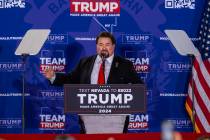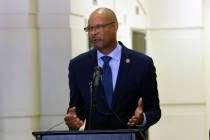Government for the top bidders
WASHINGTON — There’s a certain irony in the Supreme Court remaining open while much of the federal government is shut, for the high court created much of the dysfunction that cripples Washington today.
The court has failed to undo the partisan redistricting that has left the House of Representatives hopelessly polarized. It has furthered Americans’ cynicism toward politics with nakedly political rulings such as Bush v. Gore. Above all, it has created a campaign-finance system that is directly responsible for the rise of uncompromising leaders on both sides of the Capitol.
Political money was again before the Supreme Court on Tuesday morning, and, judging from their questions in the case of McCutcheon v. FEC, the conservative justices are poised to make things even worse. Now they are prepared to expand on their 2010 decision, which caused an explosion of independent spending, by allowing the wealthy to give about $3.5 million apiece to candidates and parties in each election cycle. Their rationale: They’ve already allowed the system to become so flooded with money that more won’t hurt.
“It’s not that we’re stopping people from spending big money on politics,” Justice Antonin Scalia argued. “When you add all that up, I don’t think $3.5 million is a heck of a lot of money.”
Actually, Nino, $3.5 million is a lot of money. As Solicitor General Donald Verrilli tried to point out, that means a party can get everything it needs to run all congressional races around the country from fewer than 500 people. “There is a very real risk both that the government will be run of, by and for those 500 people and that the public will perceive that the government is being run of, by and for those 500 people,” Verrilli said.
Scalia wasn’t impressed. He said it is “fanciful to think that the sense of gratitude” lawmakers feel toward their big donors “is any greater than the sense of gratitude that that senator or congressman will feel to a PAC, which is spending an enormous amount of money in his district or in his state for his election.”
It was as if Scalia, having left the stable door open, noticed that a horse had bolted — and decided the best solution would be to set the rest of the animals free.
Verrilli suggested, politely, that the court may have been wrong in dismissing “the risks of corruption from independent expenditures,” too.
“It is what it is,” Scalia said blithely.
Yes, it is. The 1976 decision in Buckley v. Valeo made government for sale and created the arms race in campaign financing by equating unlimited spending with free speech. The court in 2010 made the system dramatically worse in its Citizens United decision, loosening restrictions and spurring wealthy donors to make hundreds of millions of dollars in independent expenditures. Now the court considers selling what remains of the government to about 500 people — the Koch brothers and their ilk, who have already filled the halls of Congress with tea party representatives, and liberal billionaires who will no doubt seek to make similar purchases.
Scalia may not be aware of this because he does not read The New York Times or The Washington Post, which he says is “so shrilly, shrilly liberal” and “often nasty.” In an interview with New York magazine published this week, he said he reads The Wall Street Journal and The Washington Times and listens to conservative talk-radio hosts such as Bill Bennett.
If Scalia got out of his ideological echo chamber, he would discover that, encouraged by the court, wealthy conservatives donate to groups such as the Club for Growth and Heritage Action, which threaten to fund primary challenges to Republican lawmakers who show any ideological impurity. Because most Republicans are in safe seats (in part because of Supreme Court-sanctioned gerrymandering), the only threat to their re-election is in a primary — and so they have no choice but to obey the conservative billionaires’ wishes. The problem on the left isn’t as acute, but it’s only a matter of time before liberal billionaires execute a similar purge.
And yet Bobby Burchfield, a lawyer arguing against the spending limits on Tuesday, told the justices the rich suffer “a severe restriction on political speech.”
The poor dears.
Justice Elena Kagan said those who give $3.5 million should expect “special treatment” from Congress, and Burchfield didn’t disagree. Under the Citizens United decision, he said, “gratitude and influence are not considered to be quid-pro-quo corruption.”
He’s right. A few billionaires have purchased a Congress full of unbending extremists, and the Supreme Court made it all legal.
Follow Dana Milbank on Twitter, @Milbank. (c) 2013, Washington Post Writers Group
















